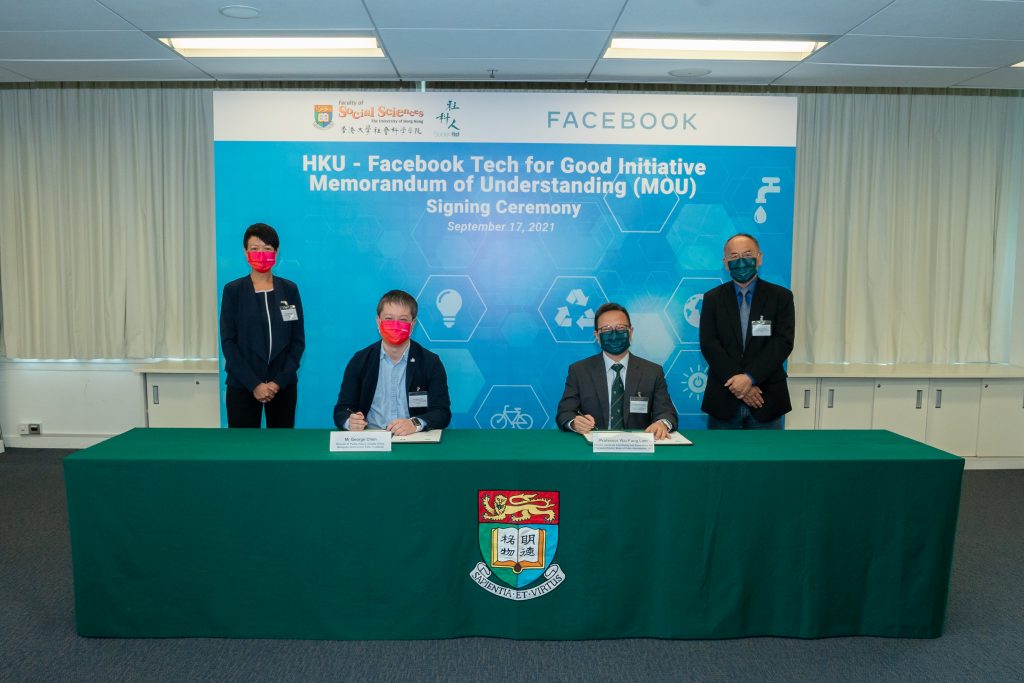The University of Hong Kong (HKU) announced the launch of the “Tech for Good Initiative” today (September 17), at the Memorandum of Understanding signing ceremony with Facebook Hong Kong. In collaboration with Facebook, Tech for Good Initiative” promises to strengthen institutional innovations with the use of Artificial Intelligence (AI) and Big Data in governance and public policy in a manner that is socially embedded, conducive to sustainability, and compatible with inclusive growth.
Professor Wai-Fung Lam, Director of the Centre for Civil Society and Governance of HKU, and Mr. George Chen, Director of Public Policy for Greater China, Mongolia, and Central Asia of Facebook represented the two parties in signing the MoU. It was witnessed by Professor Paul Yip, Acting Dean of Social Sciences of HKU, and Ms. Jayne Leung, Vice President and Head of Greater China of Facebook.
As part of the“Tech for Good Initiative” framework, HKU and Facebook have co-designed a new course “AI Policy Lab – Opportunities and Challenges in Digital Governance” (POLI8023 / SLGP7104), which will be taught by HKU scholars from the Faculty of Social Sciences and Facebook experts from different fields including Public Policy, Corporate Sustainability, Data Privacy, Automation, Misinformation, Legal and Content Regulations. The course will be open to students of HKU’s Master of Public Administration (MPA), Master of International and Public Affairs (MIPA) and Master of Social Sciences in the field of Sustainability Leadership and Governance (MSocSc SLG) programmes.
Besides, HKU will collaborate with Facebook to launch the new “Facebook-HKU Scholarship in Public Policy” to support a number of students and young scholars every year to conduct public policy research projects focussing on AI, AR/VR, ethics, cybersecurity and public policy-related areas. Facebook will also make a donation to HKU as a research grant. “Tech for Good Initative” will be housed at the Centre for Civil Society and Governance, with two co-directors overseeing the initative: Professor Wai-Fung Lam, representing HKU and Mr. George Chen, representing Facebook.
Professor Wai-Fung Lam said: “I’m glad to bring HKU and Facebook together to launch this meaningful initiative, which will be an exciting one where a slew of teaching, research and community outreach activities will follow. HKU students will have the opportunity to enroll in a field trip to Facebook’s headquarters in Silicon Valley and the new Facebook Scholarships in Public Policy will be set up soon, which will benefit many young scholars. We expect the research and community outreach programmes to further build up an enabling ecosystem for the ethical use of AI and Big Data in the attainment of a sustainable society.”
Mr. George Chen added, “The collaboration with HKU complements Facebook’s existing partnerships with other renowned academic institutions internationally. I’m thrilled to have the opportunity to bring many leading HKU scholars and Facebook experts together to jointly tackle some emerging challenges in the interplay between technology and policy and I also look forward to some high quality research papers to be published annually through the “Tech for Good Initiative” that will certainly bring policy implications to Hong Kong and beyond.”
Three series of research papers, namely, Tech for Resilience, Tech for Commoning, and Tech for Public Governance will be published for three consective years under the “Tech for Good Initative” framework. As part of the community outreach programme, an action research with a focus on AI in commoning will be launched in 2022. The project will seek to engage keen stakeholders in the civil society as well as members of the wider community. More details will be announced later this year.
To find out more, please visit https://ccsg.hku.hk/tgi-about/.
Please find high-res photos here.
Category : Research

